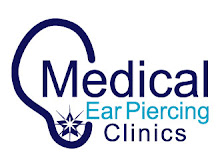It is important that ear piercing be done safely and hygienically. Infections after ear piercing can occur due to use of non sterile piercing techniques, equipment or earrings.
Inserting earrings, brought in by parents, into newly pierced ears, can be a source of contamination and should be discouraged. These earrings also tend to be made of gold which containd nickel and thus has a chance of causing irritation due to nickel allergy.
In the rare instance that infection is suspected, a visit with a medical professional is needed to diagnose and treat the condition.
The Medical Ear Piercing Clinics are unique in that we are staffed not only to offer safe ear piercings, but also to diagnose and treat any infections. Call us today at 973 552 2803 to schedule your ear piercing.
Saturday, July 17, 2010
Monday, March 15, 2010
Baby Ears - To Pierce or Not to Pierce?
Should I pierce my baby's ears?In my 20 years as a pediatrician this is one of the questions I have been unable to find an answer for, from the medical textbooks or journals. While ear piercing can be considered cosmetic, any procedure that involves breaking through the skin is, in my opinion medical. Very few alternatives exist outside of tattoo parlors or mall kiosks, for parents seeking this procedure, as very few physicians provide the service.
Whether or not to pierce a baby's ears is a decision that a parent has to make and is usually based on their cultural background and personal experience. We have successfully pierced the ears of baby's of all ages through adulthood with excellent results. The more important questions to ask are:
When, Where, By Whom and With What?
Many places will not pierce the ears of a baby under 3 months or in some cases 6 months. Reasons stated for this are so that the child would have already received some immunizations. The immunizations that are received at age 6 months and under protect a baby from hepatitis B and tetanus which are transmitted through blood and dirt spores respectively. The risks of ear piercing are as follows: infection (same as anytime the skin is broken), pain (same as any time the skin is peirced such as for a shot) and local irritation. These risks can be avoided by having this procedure done by a medical professional under the same kind of sterile conditions used for immunizations. Equipments should be sterile and earrings should be made of medical grade non allergenic material. With these steps and proper after care of the pierced ear, good results can be obtained at all ages. Visit us at www.medicalearpiercing.com
Subscribe to:
Posts (Atom)
